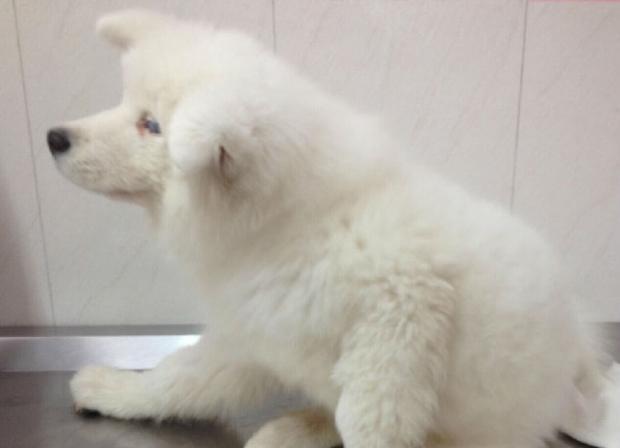1. Case introduction
Pet Name: Snow White, Breed: Samoyed, Gender: Female, Age: 4 months, Immunity: Injected a dog quadruple a month ago, has been raised for half a month, Deworming status: Not dewormed.
Chief Complaint: A week ago, I had cough and diarrhea. I took some medicine at the pet store for 5 days, and it occasionally improved. However, the cough and diarrhea were severe the day before yesterday.
II. Clinical examination and diagnosis and treatment
Body weight: 10.1kg, body temperature: 40.5°C, heart rate: 134/min, respiration: 48/min, corneal edema of bilateral eyes, more secretions, dry nose, purulent viscous secretions, positive cough inducement.

Typical Blue Eye Symptoms
Fecal examination: a large number of roundworms.
| items | Results | Reference value | Item | Results | Reference value |
| WBC | 3.5 | 6-16.9 | RBC | 5.0 | 5.5-8.5 |
| LYM | 0.4 | 0.7-5.1 | ALP | 150 | 14-111 |
| OTHR | 3.1 | 3.6-13 | ALT | 180 | 12-130 |
| ALB | 15 | 22-40 |
X-ray images show lung infection
3. Treatment
Day 1
1. Alpha interferon, 2 million IU, subcutaneous injection, once a day.
2. Immune globulin, 2.5ml, subcutaneous injection, once a day.
3. Ceftriaxone 50mg/kg, subcutaneous injection, twice a day.
4. Aminophylline 10mg/kg, subcutaneous injection, twice a day.
5. Qingkailing 2ml, subcutaneous injection, twice a day.
6. Sodium lactate Ringer's solution 200ml, vitamin C 500mg, inosine 100mg, ATP 100mg, coenzyme A 200IU, 50% glucose 15ml, mixed intravenous drip.
7. 30ml of normal saline, 5ml of albumin, mixed intravenous drip.
8, Mike Shushi cough medicine, 2 times a day, 2ml each time.
9, Danomaline, oral once a day.
10. Take 2 tablets of Chongqing, take one tablet on the same day, and take the second tablet after 15 days.
Day 2
Chief Complaint: The cough has improved, and after eating some rice and chicken breast, there are roundworms in the stool.
Body temperature: 40.0°C, the treatment plan is the same as the first day.
3rd day
Chief Complaint: After returning home, she was in good spirits, increased food and water, and coughed slightly at night.
Body temperature: 39.8°C, treatment plan: the same as the second day.
Day 4
Chief Complaint: My condition is much better, I have eaten a lot, and I didn't cough much last night.
Body temperature: 39.1°C, treatment plan:
1. Ceftriaxone 500mg, subcutaneous injection, twice a day.
2. Aminophylline 100g, subcutaneous injection, twice a day.
3. Sodium lactate Ringer's solution 200ml, vitamin C 500mg, inosine 100mg, ATP 100mg, coenzyme A 200IU, 50% glucose 15ml, mixed intravenous drip.
4. 30ml of normal saline and 5ml of albumin, mixed with intravenous drip.
5. Mike Shushi Cough Lotion, 2 times a day, 2ml each time.
6, Danomaline, orally once a day.
Day 5
Chief Complaint: Eating and drinking are basically normal, and occasionally coughing once or twice.
Body temperature: 39.1°C, treatment plan:
1. Ceftriaxone 500mg, subcutaneous injection, twice a day.
2. Aminophylline 100mg, subcutaneous injection, twice a day.
3. Sodium lactate Ringer's solution 200ml, vitamin C 500mg, inosine 100mg, ATP 100mg, coenzyme A 200IU, 50% glucose 15ml, mixed intravenous drip.
4. Mike Shushi Cough Lotion, 2 times a day, 2ml each time.
5, Danomaline, oral once a day.
Day 6
Chief Complaint: Go home in good condition and no longer cough.
Body temperature: 39.1°C, heart rate: 120/min, respiration: 36/min, a small amount of nasal and eye secretions.
treatment plan:
1. Ceftriaxone 500mg, subcutaneous injection, twice a day.
2. Mike Shushi Cough Lotion, 2 times a day, 2ml each time.
3, Danomaline, orally once a day.
I negotiated with the animal owner, if there is no problem at home, I will not go to the hospital tomorrow. I will take medicine at home, and take Mike Shushi Cough Potion for two more days.
A week later, the pet owner brought the dog for vaccinations and it was doing fine.
IV. Summary
Canine infectious hepatitis (ICH) is a DNA adenovirus that affects multiple systems. It is divided into two serotypes, CAV-1 and CAV-2. The two are closely related, but the former causes ICH.
In addition to internal parasites, other symptoms of the dog in this case are more in line with the typical symptoms of canine infectious hepatitis, and the treatment is mainly anti-virus, anti-inflammatory, and liver protection.
